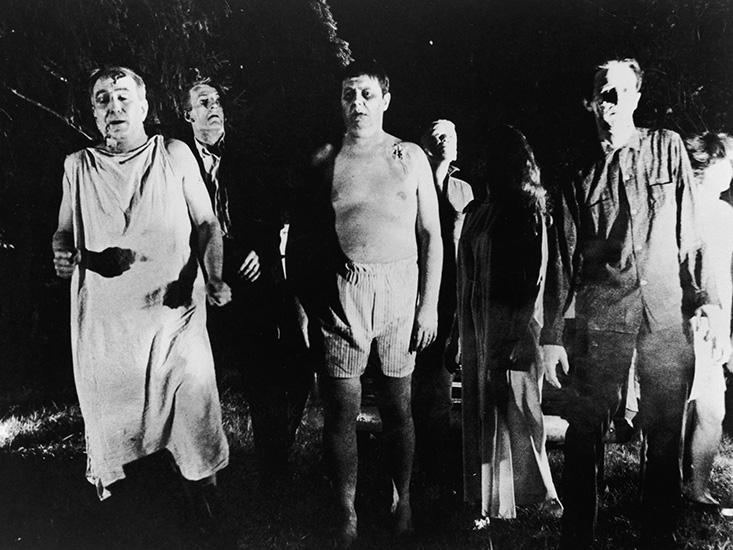David Chalmers, who coined the phrase “Hard Problem of consciousness,” is arguably the leading modern advocate for the possibility that physical reality needs to be augmented by some kind of additional ingredient in order to explain consciousness—in particular, to account for the kinds of inner mental experience pinpointed by the Hard Problem. One of his favorite tools has been yet another thought experiment: the philosophical zombie.
Unlike undead zombies, which seek out brains and generate movie franchises, philosophical zombies look and behave exactly like ordinary human beings. Indeed, they are perfectly physically identical to non‐zombie people. The difference is that they are lacking in any inner mental experience. We can ask, and be puzzled about, what it is like to be a bat, or another person. But by definition, there is no “what it is like” to be a zombie. Zombies don’t experience.

The possible existence of zombies hinges on the idea that one can be a naturalist but not a physicalist—we can accept that there is only the natural world, but believe that there is more to it than its physical properties. There are not, according to this view, nonphysical kinds of things, such as immaterial souls. But the physical things with which we are familiar can have other kinds of properties—there can be a separate category of mental properties. This view is property dualism, as distinct from good old‐fashioned Cartesian substance dualism, which holds that there are physical and nonphysical substances.
The idea is that you can have a collection of atoms, and tell me everything there is to say about the physical properties of those atoms, and yet you haven’t told me everything. The system has various possible mental states. If the atoms make up a rock, those states might be primitive and unobservable, essentially irrelevant. But if they make up a person, a rich variety of mental states come to life. To understand consciousness, on this view, we need to take those mental properties seriously.
You don’t think you’re a zombie, but that’s just what a zombie would say.
If these mental properties affected the behavior of particles in the same way that physical properties like mass and electric charge do, then they would simply be another kind of physical property. You are free to postulate new properties that affect the behavior of electrons and photons, but you’re not simply adding new ideas to the Core Theory (the enormously successful model of the particles and forces that make up you, me, the sun, the moon, the stars, and everything you have ever seen, touched, or tasted in all your life). Instead, you are saying that it is wrong. If mental properties affect the evolution of quantum fields, there will be ways to measure that effect experimentally, at least in principle, not to mention all of the theoretical difficulties with regard to conservation of energy and so on that such a modification would entail. It’s reasonable to assign very low credence to such a complete overhaul of the very successful structure of known physics.
Alternatively, we could imagine that mental properties just go along for the ride, as far as physical systems are concerned. The Core Theory can be a complete description of the physical behavior of the quantum fields we are made of, but not a complete description of us. Such a description would need to specify our mental properties as well. Zombies would be collections of particles in exactly the same arrangement as would ordinarily make up a person, obeying the same laws of physics and therefore behaving in precisely the same way, but lacking the mental properties that account for inner experience. As far as you can tell by talking to them, all of your friends and loved ones are secretly zombies. And they can’t be sure you’re not a zombie. Perhaps they have suspicions.
The big question about zombies is a simple one: Can they possibly exist? If they can, it’s a knockout argument against the idea that consciousness can be explained in completely physical terms. If you can have two identical collections of atoms, both of which take the form of a human being, but one has consciousness and the other does not, then consciousness cannot be purely physical. There must be something else going on, not necessarily a disembodied spirit, but at least a mental aspect in addition to the physical configuration.
When we talk about whether zombies are possible, we don’t necessarily mean physically possible. We don’t need to imagine that we could find an honest‐to‐goodness zombie here in our real world, made out of the same particles that you and I are made from (if you’re not a zombie, which I’m going to assume henceforth). We’re just imagining a possible world, with a different fundamental ontology, even though it might have very similar‐seeming particles and forces. What it would be lacking is mental properties.
As long as zombies are conceivable or logically possible, Chalmers argues, then we know that consciousness is not purely physical, regardless of whether zombies could exist in our world. Because then we would know that consciousness can’t simply be attributed to what matter is doing: The same behavior of matter could happen with or without conscious experience.
As far as you can tell by talking to them, all of your friends and loved ones are secretly zombies.
Of course, Chalmers also then says that zombies are conceivable. He has no trouble conceiving of them, and maybe you feel the same way. Can we then conclude that there is more to the world than just the physical universe?
Deciding whether something is “conceivable” is harder than it might seem at first glance. We can conjure up an image in our mind of someone that looks and acts just like a human being, but who is dead inside, with no inner experiences. But can we really do so without imagining any differences in the physical behavior of them versus an ordinary person?
Imagine a zombie stubbed its toe. It would cry out in pain, because that’s what a human would do, and zombies behave just like humans. When you stub your toe, certain electrochemical signals bounce around your connectome, and the exact same signals bounce around the zombie connectome. If you asked it why it cried out, it could say, “Because I stubbed my toe and it hurts.” When a human says something like that, we presume it’s telling the truth. But the zombie must be lying, because zombies have no mental states such as “experiencing pain.” Why do zombies lie all the time?
For that matter, are you sure you’re not a zombie? You think you’re not, because you have access to your own mental experiences. You can write about them in your journal or sing songs about them in a coffee shop. But a zombie version of you would do those things as well. Your zombie doppelgänger would swear in all sincerity that it had inner experiences, just as you would. You don’t think you’re a zombie, but that’s just what a zombie would say.

The problem is that the notion of “inner mental states” isn’t one that merely goes along for the ride as we interact with the world. It has an important role to play in accounting for how people behave. In informal speech, we certainly imagine that our mental states influence our physical actions. I am happy, and therefore I am smiling. The idea that mental properties are both separate from physical properties, and yet have no influence on them whatsoever, is harder to consistently conceive of than it might first appear.
According to poetic naturalism, philosophical zombies are simply inconceivable, because “consciousness” is a particular way of talking about the behavior of certain physical systems. The phrase “experiencing the redness of red” is part of a higher‐level vocabulary we use to talk about the emergent behavior of the underlying physical system, not something separate from the physical system. That doesn’t mean it’s not real; my experience of redness is perfectly real, as is yours. It’s real in exactly the same way as fluids and chairs and universities and legal codes are real—in the sense that they play an essential role in a successful description of a certain part of the natural world, within a certain domain of applicability. It might seem strange that the logical possibility of a concept depends on whether this or that ontology turns out to be true, but we can’t decide whether “humanlike beings without consciousness” is a sensible concept until we know what consciousness is.
In 1774, British clergyman Joseph Priestley isolated the element of oxygen. If you asked him whether he could imagine water without any oxygen, he presumably would have had no problem, since he didn’t know that water is made of molecules with one oxygen atom and two hydrogens. But now we know better, and realize that “water without oxygen” is not conceivable. In some possible world with somewhat different laws of physics, there may be another substance that is not H2O, yet has all the phenomenological properties of water—liquid at room temperature, transparent to visible light, and so on. But it wouldn’t be the water that we know and love. Likewise, if you think that conscious experience is something truly distinct from the physical behavior of matter, you should have no trouble imagining zombies; but if consciousness is just a concept we use to describe certain physical behaviors, zombies become inconceivable.
The idea that our mental experiences or qualia are not actually separate things, but instead are useful parts of certain stories we tell about ordinary physical things, is one that many people find hard to swallow.
Even with the best of intentions on both sides, a dialogue between a property dualist who believes in the separate reality of mental properties (call him M) and a poetic naturalist who believes they are just ways of talking about physical states (call her P) can be frustrating. It might go something like this:
M: I grant you that, when I am feeling some particular sensation, it is inevitably accompanied by some particular thing happening in my brain—a “neural correlate of consciousness.” What I deny is that one of my subjective experiences simply is such an occurrence in my brain. There’s more to it than that. I also have a feeling of what it is like to have that experience.
P: What I’m suggesting is that the statement “I have a feeling …” is part of an emergent way of talking about those signals appearing in your brain. There is one way of talking that speaks in a vocabulary of neurons and synapses and so forth, and another way that speaks of people and their experiences. And there is a map between these ways: When the neurons do a certain thing, the person feels a certain way. And that’s all there is.
M: Except that it’s manifestly not all there is! Because if it were, I wouldn’t have any conscious experiences at all. Atoms don’t have experiences. You can give a functional explanation of what’s going on, which will correctly account for how I actually behave, but such an explanation will always leave out the subjective aspect.
P: Why? I’m not “leaving out” the subjective aspect, I’m suggesting that all of this talk of our inner experiences is a useful way of bundling up the collective behavior of a complex collection of atoms. Individual atoms don’t have experiences, but macroscopic agglomerations of them might very well, without invoking any additional ingredients.
M: No, they won’t. No matter how many non‐feeling atoms you pile together, they will never start having experiences.
P: Yes, they will.
W: No, they won’t.
P: Yes, they will.
And you can imagine how it continues from there.
Nevertheless, let’s make one more good‐faith effort to explain to an open‐minded property dualist how a poetic naturalist thinks about qualia. What do we mean when we say “I am experiencing the redness of red?” We mean something like this: There is a part of the universe I choose to call “me,” a collection of atoms interacting and evolving in certain ways. I attribute to “myself” a number of properties, some straightforwardly physical, and others inward and mental. There are certain processes that can transpire within the neurons and synapses of my brain, such that when they occur I say, “I am experiencing redness.” This is a useful thing to say, since it correlates in predictable ways with other features of the universe. For example, a person who knows I am having that experience might reliably infer the existence of red‐wavelength photons entering my eyes, and perhaps some object emitting or reflecting them. They could also ask me further questions such as “What shade of red are you seeing?” and expect a certain spectrum of sensible answers.
There may also be correlations with other inner mental states, such as “seeing red always makes me feel melancholy.” Because of the coherence and reliability of these correlations, I judge the concept of “seeing red” to be one that plays a useful role in my way of talking about the universe as described on human scales. Therefore the “experience of redness” is a real thing. It’s a mouthful, and nobody would ever mistake it for a Shakespearean sonnet. But there’s a kind of poetry there, if you look closely enough.
We can conjure up an image of someone that looks and acts just like a human being, but who is dead inside, with no inner experiences.
There are two points of view relevant to consciousness that are close cousins of poetic naturalism, but different in important ways.
One view is to argue that all of these so‐called qualia or inner experiences simply don’t exist—they are illusions. Maybe you thought you had inner experiences, but that is an antiquated part of our intuitive view of the world, a relic of a prescientific age. Now we know better, and should use a more updated and appropriate set of concepts.
The other perspective is a strong form of reductionism that insists that subjective experiences simply are physical processes happening in the brain. They exist, but they can be identified with specific neural correlates. A famous example along these lines comes from philosopher Hilary Putnam, who contemplated—to refute the idea, not to defend it—the position that “pain” is to be literally identified with “the firing of C‐fibers.” (C‐fibers are a part of the nervous system that carries pain signals.)
A poetic naturalist has no trouble saying that conscious experiences exist. They are not part of the fundamental architecture of reality, but they serve as essential pieces of an emergent effective theory. The best way we have of talking about people and their behaviors makes important reference to their inner mental states; therefore, by the standards of poetic naturalism, those states are real, existing things.
There is a relationship between the different ways we have of talking about the world, including the human‐level vocabulary that includes our subjective experiences, and the cell‐biological level that includes firing nerve fibers, and the particle‐physics level that includes fermions and bosons. The relationship is that certain states in the more comprehensive theories (particles, cells) correspond to unique states in the coarse‐grained theories (people, experiences). The reverse relationship is typically not unique; there may be a large number of arrangements of atoms that correspond to “me being in pain.”
A subtle but important distinction lurks between “there is a map between the concepts of different theories” and “the concepts of the coarse grained theories are to be identified with certain states in the more comprehensive theories,” such as “pain is to be identified with the firing of C‐fibers.” The difference is important because granting the latter, stronger formulation gets us in trouble. Putnam, for example, would then want to ask, “Do you mean to say there can be no such thing as pain without the existence of C‐fibers? That artificial beings, or aliens, or even very different animals here on Earth, are by definition incapable of feeling pain?”
We don’t want to say that, and we don’t have to. There are certain configurations of atoms that correspond to “a human being feeling pain,” but there could be other configurations of atoms that correspond to “a Wookiee feeling pain,” or any related instantiation of the concept. (There is nothing in principle that prevents a computer from feeling pain.) Poetic naturalism is “poetic” because there are different stories we can tell about the world, many of them capturing some aspects of reality, and all useful in their appropriate context.
There’s no reason for us to pretend that subjective experiences don’t exist, or on the other hand that they “are” something happening in the brain. They are essential concepts within a way of talking about things happening in our brains, and that makes all the difference.
Sean Carroll is a theoretical physicist at the California Institute of Technology. He received his doctorate at Harvard, and conducted research at MIT, the Institute for Theoretical Physics in Santa Barbara, and the University of Chicago.
From The Big Picture by Sean Carroll, published by Dutton, an imprint of Penguin Publishing Group, a division of Penguin Random House LLC. Copyright © 2016 by Sean Carroll.
Illustration created from A Bar at the Folies-Bergère by Edouard Manet.


























